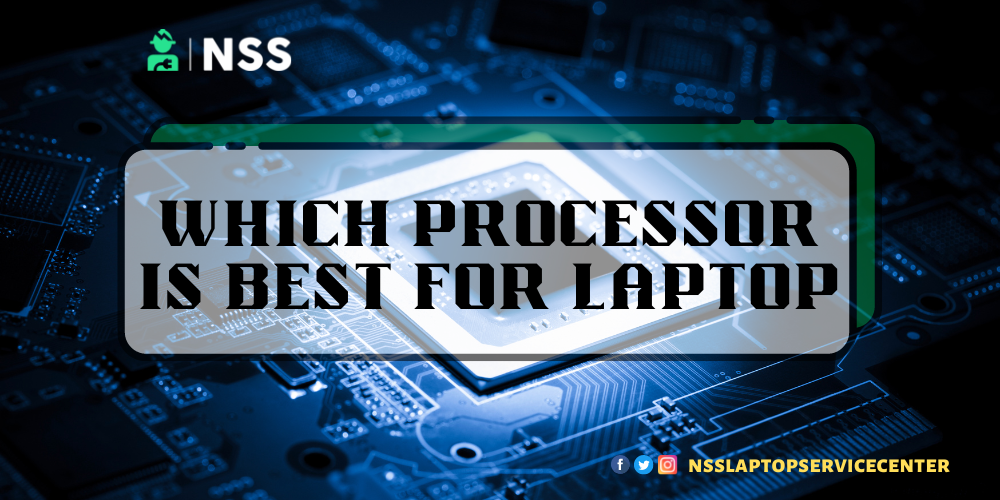
Which processor is best for a laptop
The uncertainty brought on by the overwhelming variety of processor models and brands make choosing a laptop problematic. Why isn't selecting a computer-based just on its processor any easier? Although it's easier said than done, you may transform from an ignorant laptop buyer to an authority in the field if you have the correct knowledge. This post is committed to demystifying, organizing, and providing the information you require on the CPU your future laptop should have and its benefits and drawbacks.
Why is purchasing processors so crucial?
They must be important because they are at the core of every technology, as we are constantly informed. The faster the processor, the better your games and software will run. It is easier to attempt and picture the software and games you wish to run rather than go into each processor's specifics. You should be able to identify the laptop and processor that best meets your demands based on what you use it for the most.
This table should help you determine what kind of processor you, at the very least, require to ensure that the software runs without any hiccups. Although we aren't discussing graphics cards in this piece, they are essential to any laptop purchase. We have a section on graphics solutions for laptops.
A quicker CPU is generally a better notion, one must remember. Even if you only intend to use the laptop for web browsing and watching a few YouTube videos, a faster processor won't significantly improve your experience today. However, in the future, when browsers and other software become more processor-intensive, you won't need to upgrade to a newer laptop as soon. Spending more money now will make it last longer for you. It's vital to remember that, unlike desktop CPUs, laptop processors cannot be upgraded.
If the table makes sense, you can find specifications for the most recent models of the product families mentioned above on the Intel and AMD websites.
Faster core speeds don't mean a processor is always faster.
Things were more accessible in the past when processors could be identified by their core speeds. You would know that a 2 GHz processor outperformed a 1.4 GHz one in rate. It's critical to understand that this is no longer the case. High-end laptop processors typically have slower clock speeds than entry-level models, which average around 3.2 GHz—many processor-related parameters, including the number of cores, optimizations, cache size, etc, cause this. The general rule is that improved performance does not necessarily result from a faster core speed. A better indicator is the families and ranges.
What do you get for a laptop that costs more?
Multi-threading
Multi-threading is a feature that is frequently seen in high-end processors. They can utilize every core effectively and continuously, thanks to this. Performance in processors that support it differs significantly. You'll find this helpful if you use productivity or content production tools, even though it's not required. It substantially reduces render and compilation times. It's important to remember that high-end CPUs in pricey laptops that run at meager rates to preserve battery often have TurboBoost, which enables them to spike their core speeds up extremely high to achieve the high-performance if the application requires it.
Virtualization
Other characteristics exclusive to higher spec processors include those mentioned above and the significant distinctions. It includes virtualization. This enables users to run multiple operating systems and environments inside of, say, Windows or Linux, using virtualization technologies that are simple to use. This is perfect for administrators or developers who want to create and test things on the same laptop as other systems.
Hopefully, this will make it a little easier to select a laptop based on your needs. Other performance improvements have been made, such as the faster program loading speed provided by some laptops' solid-state storage.
Whether you're a gamer or not, graphics cards are critical to a laptop's performance. Do you have any queries about the best laptop to buy? Go to the Reliance Digital store that is nearby. We'll be pleased to help you choose a computer that offers the most value for your money.
Also Read: Use A Mobile Camera As a Webcam
Also Read: Best Cheapest Laptop For Gaming
Conclusion:
I won't say much, as the blog has informed you all about which processor is best for a laptop. It is an easy process, and you can use it for various purposes.
Frequently Asked Questions
Popular Services
- MacBook Battery Replacement Cost
- HP Printer Repair in Delhi NCR
- Dell Laptop Repair
- HP Laptop Repair
- Samsung Laptop Repair
- Lenovo Laptop Repair
- MacBook Repair
- Acer Laptop Repair
- Sony Vaio Laptop Repair
- Microsoft Surface Repair
- Asus Laptop Repair
- MSI Laptop Repair
- Fujitsu Laptop Repair
- Toshiba Laptop Repair
- HP Printer Repair Pune
- Microsoft Surface Battery Replacement
- Microsoft Surface Screen Replacement




